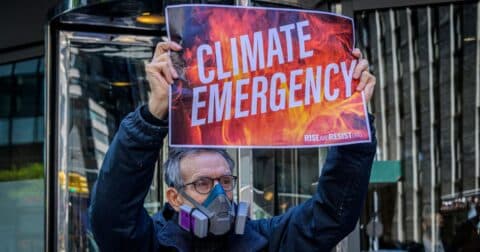Investigation
What Does a Small Town Do When the Water Is Undrinkable?
Climate•8 min read
Reported
A majority of people surveyed expressed willingness to eat less meat to curb climate pollution.


Words by Julieta Cardenas
The language we use can influence how people think about climate change. According to new research from the University of Southern California, words that seem to mean the same thing at first glance can come across very differently. Researchers surveyed more than 5,000 U.S. participants, and found high levels of familiarity with, and concern for, the terms “climate change” and “global warming.” A majority also expressed willingness to eat less meat “to do something about ‘climate change’,” though researchers found a divide once they took politics into account.
First, no matter the party, a majority of Democrats, Republicans and Independents were all familiar with both “climate change” and “global warming.” But Democrats were both more likely to be concerned about climate change and more likely to be willing to eat less meat to curb emissions.
The researchers also looked at the term “climate justice,” which became popular in the 1990s and refers to the impact on communities that are disproportionately impacted by climate change, often communities of color or low-income communities. Climate justice was seen as the least-urgent term to study participants, though the researchers point out that could be because the term isn’t as well known.
The lead author of the study, Wändi Bruine de Bruin, Director of the Schaeffer Institute’s Behavioral Science Initiative, tells Sentient that people are more concerned with climate change now than ever before, though language alone isn’t causing an uptick in concern. “I think that the reason why more people are now concerned is that they feel that they can see it’s happening,” says Bruine de Bruin. Though the language used doesn’t create concern, it can shape how people think about climate action.
Terms associated with climate change have long carried political baggage, but that first impression isn’t necessarily a permanent one. For instance, “climate change” was first seen as a more neutral term as compared to “global warming” — the former was recommended by Frank Luntz, pollster and consultant to former President George W. Bush, to “de-emphasize the role of human activity.”
The researchers trace the history of how these two terms have resonated. At the time in the early 2000s, the term “climate change” was less familiar than the term “global warming,” the researchers write, and thought to be less urgent-sounding. Yet by 2016, “climate change” became the dominant term for a hotter climate. All of this is to say that language changes over time, but it can also change back again.
In this study, the researchers found a majority of Democrats and Independents felt a sense of urgency to do something about climate change, whether called climate change or global warming or one of the other terms used. Still, no matter what you call it, a majority of participants from any party would support policies to address climate change, even though it was a slimmer majority in the case of Republican study participants.
A majority of participants in the study expressed willingness to eat less meat as a way to address climate change. Eating less red meat is one of many strategies recommended by climate researchers, and one of the most effective forms of individual climate action according to Project Drawdown.
Yet initiatives to get people in the global north eating less meat have become highly politicized, a divide that plays out in this study as well. When using the term “climate change,” 91 percent of Democrats said they were willing to eat less red meat, as compared to only 35 percent of Republicans.
For both Republicans and Independents however, the term “global warming” seemed to have more of an impact. The researchers found 45 percent of Republicans expressed willingness to reduce meat consumption when the term “global warming” was used and, for Independents, 73 percent were willing to eat less red meat to address “global warming.” That figure dropped for Independents to 68 percent for “climate change.”
When it comes to tackling food-related emissions, there are other word choices to contend with too. One study published earlier this year found that consumers tend to choose the label “plant-based” over “vegan.” When choosing between baskets full of meat and cheese or baskets with hummus and nuts, people only selected the “vegan” hummus and nuts basket 20 percent of the time, and the same basket labeled “plant-based” just 27 percent of the time. Yet when the basket was labeled “healthy” or “sustainable,” people chose it 40 percent of the time.
The bottom line: more people of all political persuasions are at least familiar with the term “climate change” and even willing to support policies that address it. But your political party seems to impact how urgently you see the issue, and also how likely you are to be willing to eat less meat. Just how familiar you are with certain words makes a difference as well, the researchers note, and that familiarity is malleable. For now, many Americans aren’t aware that eating less meat can help curb climate emissions, but with more information, that could change too.